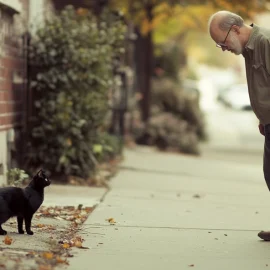

This article is an excerpt from the Shortform book guide to "The Top Five Regrets of the Dying" by Bronnie Ware. Shortform has the world's best summaries and analyses of books you should be reading.
Like this article? Sign up for a free trial here.
Do you make an effort to keep in contact with your friends? Do you often put work before your family? Do you talk openly about your feelings?
The book The Top Five Regrets of the Dying says that relationship regrets are common among the dying. Specifically, people regret putting work ahead of loved ones, not sharing their emotions, and losing touch with their friends.
Here’s what you can do to avoid this common regret.
Regrets About the People in Your Life
A type of regret Ware’s patients expressed was regrets they had about how they treated people in their lives. They felt that they failed to properly nurture the important connections in their lives and wished they’d prioritized relationships more. In the following sections, we’ll discuss regrets about relationships and lessons on maintaining a healthy work-life balance, communicating openly with loved ones, and nurturing meaningful friendships.
Here are the three most common relationship regrets to consider.
1. The Regret of Putting Work Before Relationships
One common regret that Ware’s patients had was spending too much time working instead of spending time with people they cared about. In their final days, many of her patients wished they had prioritized their loved ones instead of their careers and material success.
To illustrate, Ware shares the story of John, who deeply regretted having dedicated so much of his life to his work. For years, his wife wanted him to retire so they could travel together, but John enjoyed the sense of importance that came with his job and kept putting it off. Months before his scheduled retirement, his wife fell ill and passed away. Nearing the end of his own life, John told Ware that he wished he’d found a better work-life balance.
Simplify Your Life
To avoid the regret of working too much, Ware recommends you simplify your life by reflecting on what you need and getting rid of what you don’t. She explains that getting caught up in chasing material success—such as having a bigger house or the latest technology—can cause you to overvalue work and lose focus on other things that matter to you. Instead, focus on the quality of your life rather than the quality of your possessions. In doing so, you can find a healthier balance between work and personal life and avoid the regret that comes from valuing the wrong things.
Work With Purpose
In addition to finding a better work-life balance, Ware also recommends you find work that aligns with your purpose. Some of Ware’s patients regretted doing the wrong work for too long. When you do work that you’re passionate about, you contribute more to the world. This kind of work stops feeling like work. Instead, it becomes a natural expression of who you are, and it also attracts the greatest rewards.
2. The Regret of Not Sharing Honest Feelings
Ware writes that another regret many of her patients had was not being brave enough to be honest about their feelings.
Her client, Jozsef, spent most of his life working and keeping his family at a distance because he was afraid to open up and show his feelings. Later in life, he realized that by not being honest, he’d missed out on the closeness, warmth, and love that come from communicating openly with others. In the end, he told Ware that he wished his family could truly know and understand who he was as a person.
While holding back your feelings can feel safer and easier in vulnerable moments, says Ware, it prevents you from building stronger relationships with others and being understood for who you really are. Words left unsaid create barriers because they prevent others from being able to understand you and respond to your real feelings and needs. Ware argues that honest communication, especially about difficult topics, deepens your relationships. For instance, Ware spoke honestly with her grandmother about her grandmother’s old age and the thought of losing her. This allowed them to say everything they wanted the other person to know, share meaningful thoughts, and appreciate each other.
Speak Your Mind
Ware writes that constantly worrying about how others might react prevents us from speaking our minds. To avoid the regret of not sharing your honest feelings, Ware suggests you openly express your emotions like children do—they never hesitate to show how they’re feeling, whether they’re happy, sad, or angry. Ware acknowledges that not everyone will react well to your honesty; for example, some might end their relationships with you. But others’ reactions can help you distinguish positive, healthy relationships from superficial ones. By being honest, you can be sure that the relationships that remain are based on mutual respect and understanding.
3. The Regret of Losing Touch With Friends
Ware writes that many of her patients regretted not trying harder to maintain their friendships. As people get busy with work and family, friendships often fall by the wayside.
Ware shares how one of her patients, Doris, felt lonely in a nursing home. She didn’t have any family around because her daughter was living in a different county, busy with her own life. Doris told Ware that she longed for the company of her friends and wished that she hadn’t let her friendships fade. After some research, Ware was able to contact one of Doris’s old friends and facilitated a phone call between the two, which lifted Doris’s spirits and brought her happiness in her final days.
Recognize the Value of Real Friends
Ware suggests you recognize the value of real friends: people who care about you, stick with you through difficult times, and accept you for who you are. She explains that surrounding yourself with the wrong people can leave you feeling lonely, even if you’re not alone, because those people don’t truly understand or accept you. And unlike family, who may sometimes expect you to be a certain way, real friends are happy with you the way that you are.
Spending time with real friends who share your interests, experiences, and philosophies makes you feel like you belong somewhere and that people care about you. So, when you find a real friend, put in the effort to reach out and maintain your relationship with them.

———End of Preview———
Like what you just read? Read the rest of the world's best book summary and analysis of Bronnie Ware's "The Top Five Regrets of the Dying" at Shortform.
Here's what you'll find in our full The Top Five Regrets of the Dying summary:
- The beliefs that prevent you from living to your fullest potential
- How to make a change in your life before it’s too late
- The most common regrets people have before they die






